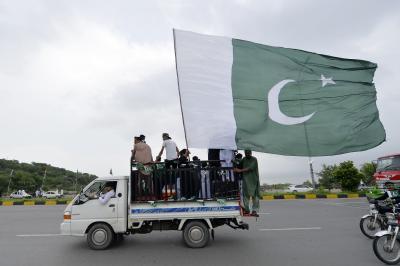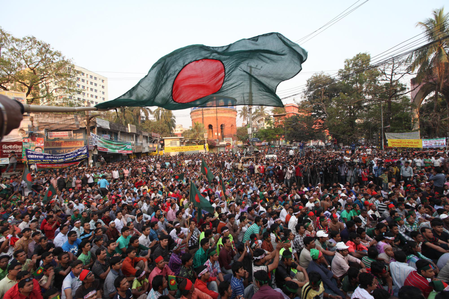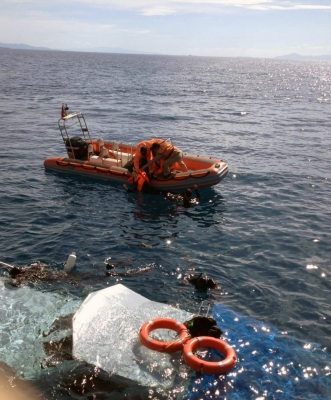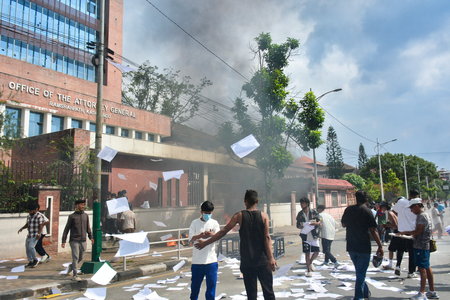
Islamabad, Oct 16 (IANS) Pakistan, which sees itself back in the regional geopolitical reckoning with the US President Donald Trump’s blessings, has very conveniently forgotten its many traditional fault lines that are multiplying with emerging internal uprisings, a report cited on Thursday.
Pakistan-occupied Kashmir (PoK) has been witnessing continuous unrest due to Pakistan’s human rights violations along with the step-motherly treatment of local residents while the unrest in PoJK has assumed very serious proportions over the past few months, an opinion piece in The Asian Age highlighted. Pakistan’s brutal response to PoK residents has resulted in death of dozens of people, including some police and security personnel.
“It is evident that Pakistan sees itself back in the regional geopolitical reckoning with Mr Trump’s blessings, especially after signing a defence agreement with Saudi Arabia and with Mr Sharif getting feted by the US President at the Sharm el-Sheikh peace conference on Gaza. Islamabad, however, conveniently forgets its many traditional fault lines multiplying with internal uprisings emerging,” wrote Lieutenant-General (Retd.) Kamal Davar who served as the first head of India’s Defence Intelligence Agency.
Lashkar-e-Tayyaba (LeT) and the Jaish-e-Mohammed (JeM) have moved their terror hideouts from PoK to Pakistan’s Khyber Pakhtunkhwa province on the Afghan border, especially in the aftermath of Operation Sindoor, in which Indian armed forces destroyed nine terror hubs in response to the April 22 Pahalgam terror attack.
“The terrorist groups appear to have lost faith in the Pakistan Army’s ability to protect them in PoK, hence the decision to relocate their camps. The protests that have been simmering in PoK are related to the local population’s social, political and economic interests. In addition, Pakistan’s exploitation of PoK’s natural resources and the non-availability of an international airport at Mirpur are other major grievances. In Pakistan, all decisions for PoK are made by the administrative council, which is headed by the Pakistan PM but has no representative from PoK. The current local protests have been more intense, with the participation of women and students also touching all important towns of PoK,” Lt. Gen. Davar highlighted in the Asian Age.
The situation in Balochistan has also turned dangerous for Pakistan’s political integrity as the Baloch Liberation Army (BLA) has been carrying out regular attacks on trains, buses and Pakistan Army convoys, posts and other military infrastructure, causing significant damage. Local residents in Balochistan have expressed opposition to the China-Pakistan Economic Corridor (CPEC) and the development of Gwadar port as they feel their resources and land is being exploited by Pakistan and they are receiving nothing in return.
“The Baloch insurgency is touching newer peaks, with the BLA employing fresh tactics involving sophisticated weapons and the induction of female suicide bombers. Pakistan has been consistently indulging in genocide against the Baloch population. According to reliable media reports and intelligence sources, Pakistan has also taken the extreme step of forming an alliance between the Lashkar-e-Tayyaba and global terror outfit ISKP, which is being handled by the Inter-Services Intelligence,” the author elaborated.
At the same time, violence is being witnessed in Khyber Pakhtunkhwa province as the terror outfit Tehreek-e-Taliban Pakistan (TTP), along with some smaller outfits, has been regularly targetting the Pakistan Army and other government assets. Recently, Pakistan’s Peshawar corps commander revealed that 917 terrorists, 303 soldiers, 73 policemen and 132 civilians have been killed in Khyber Pakhtunkhwa till September 15 this year. Pakistan’s quest for “strategic depth” in Afghanistan has also been crushed by Kabul.
“As Pakistan continues on its path towards implosion, India needs to recalibrate its Afghan strategy, especially after Operation Sindoor and the revival of fraternal ties between the two nations. India must expand its diplomatic and economic footprint in Afghanistan, endeavour for convergence on strategic and security matters, especially combating terrorism together while enhancing the speedy development of Chabahar port. In addition, India should also try to establish regional cooperation in diverse issues with Russia, Iran and the Central Asian republics. It would also help if India could try to shape a mutually beneficial South Asian architecture in place of the current regional churnings,” mentioned Lt. Gen. Kamal Davar.
–IANS
akl/as




